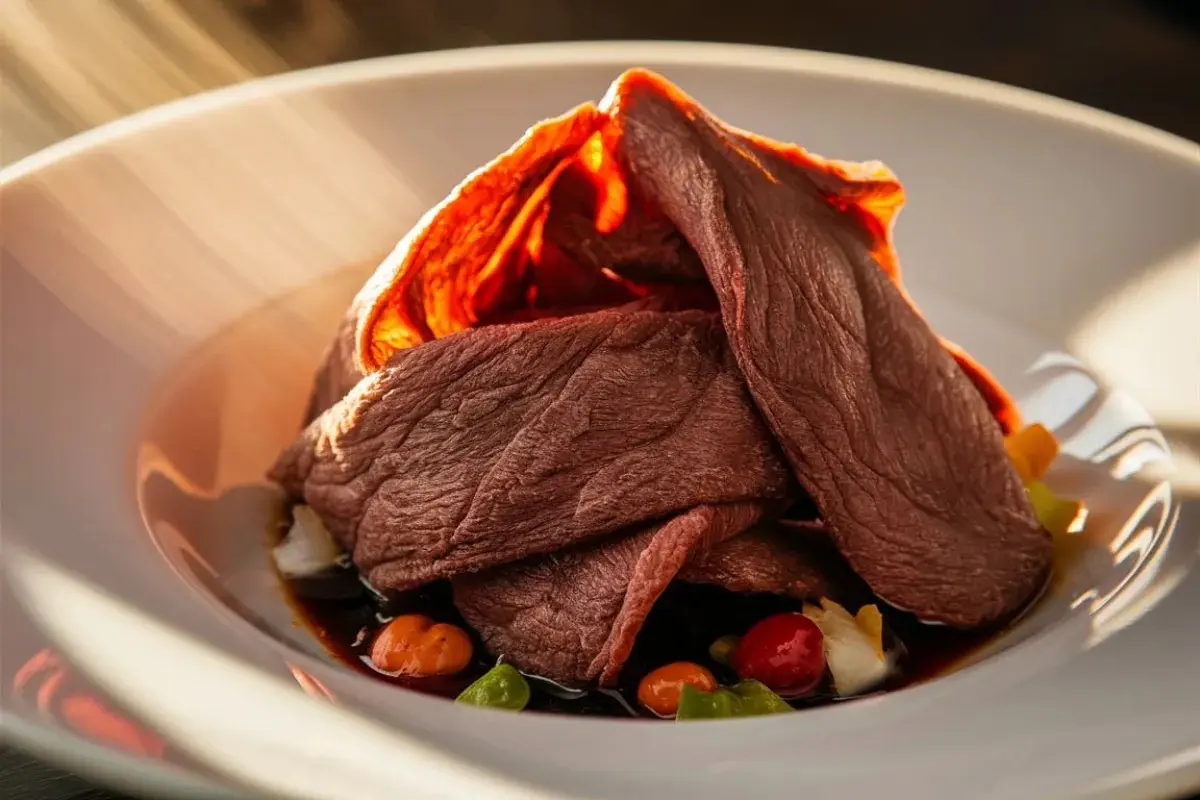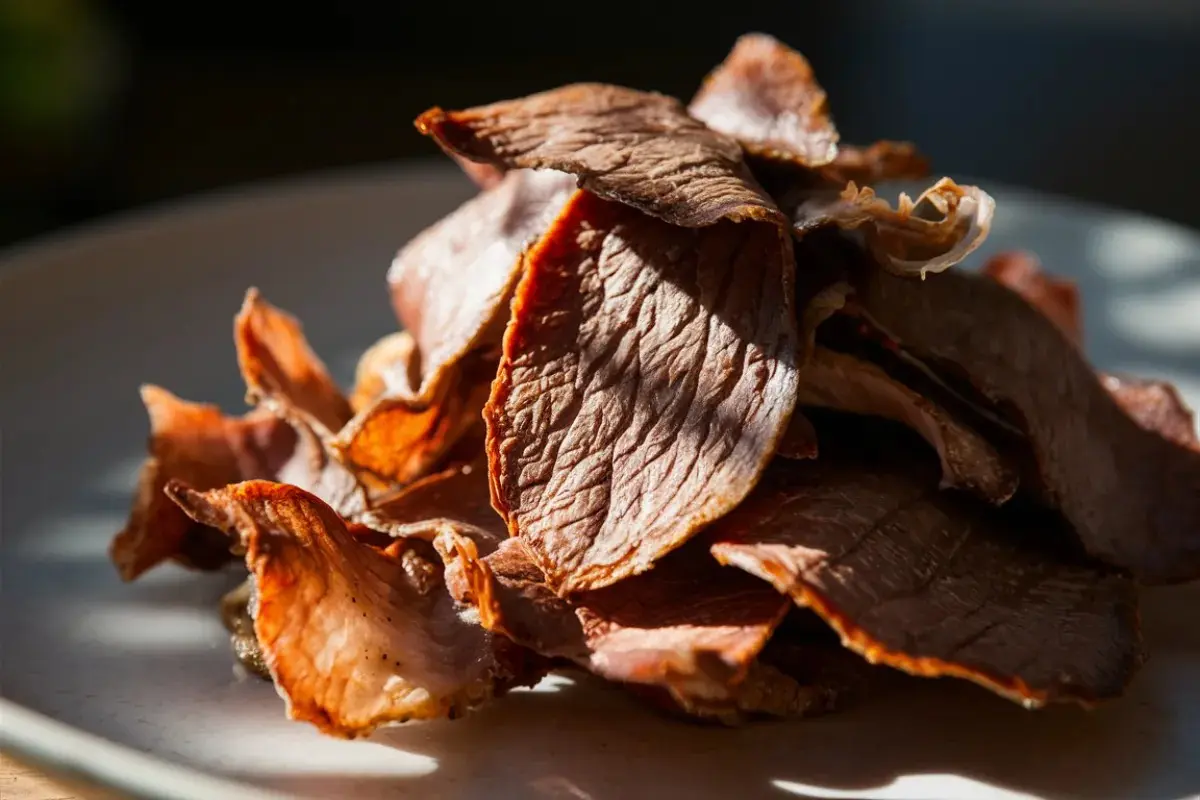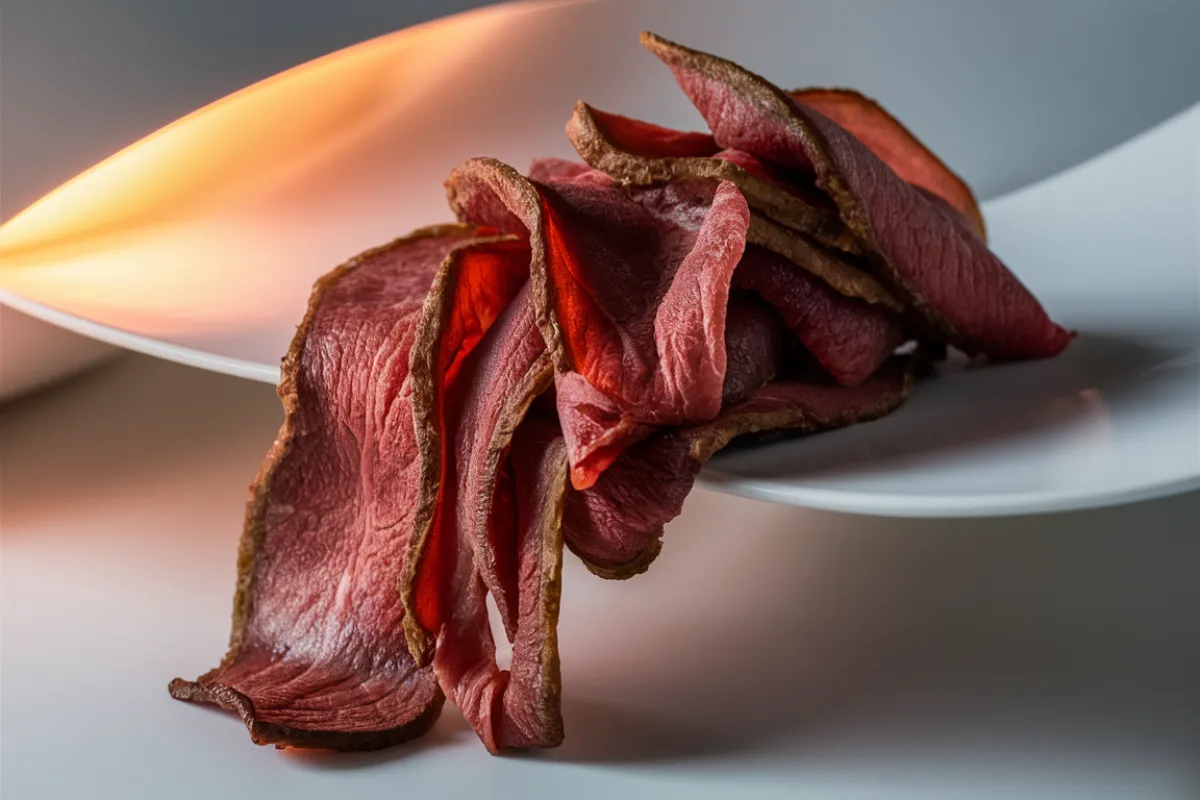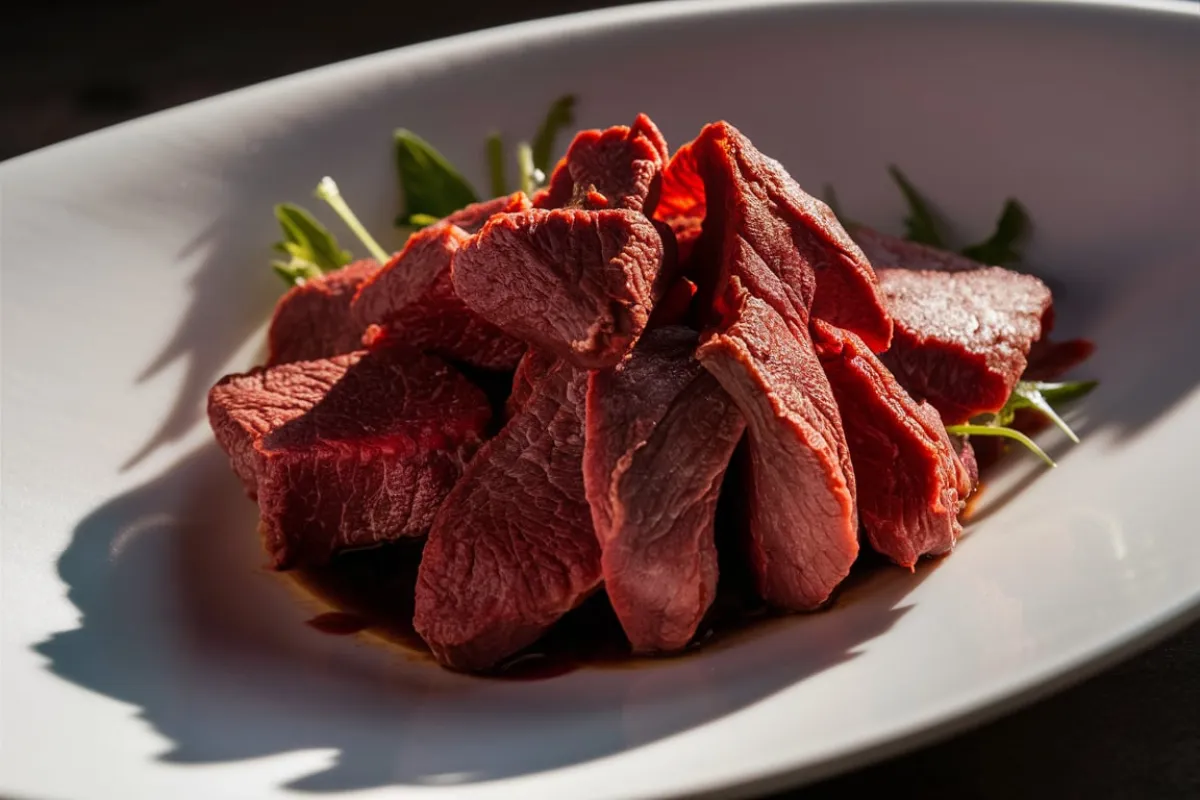Dehydrated beef has long been a popular choice for those looking to store meat for an extended period. Dehydration involves removing moisture from beef, which significantly reduces the growth of bacteria, mold, and yeast. This process allows the beef to be stored for much longer than fresh or cooked meat. Whether you are a camper, a prepper, or just someone interested in long-term food storage, understanding how long dehydrated beef lasts is essential.
In this comprehensive guide, we will discuss the various factors affecting the shelf life of dehydrated beefs, storage methods to extend its longevity, and practical tips to ensure your dehydrated beefs remains fresh and safe for consumption. We will also debunk some common myths and answer frequently asked questions about dehydrated beefs.
Why Dehydrate Beef?
Dehydrating beefs offers multiple advantages:
- Prolonged Shelf Life: Properly dehydrated and stored beef can last anywhere from several months to several years, depending on the conditions.
- Preservation of Nutritional Value: Dehydration retains most of the beef’s natural nutrients, making it a nutritious option for long-term storage.
- Lightweight and Easy to Store: Dehydrated beef is compact, easy to store, and ideal for situations where space and weight are considerations, such as hiking, camping, or stocking up for emergencies.
- Convenience: You can rehydrate dehydrated beef quickly and use it in a wide range of recipes, making it versatile for various culinary needs.
For creative ways to use your dehydrated beef, consider incorporating it into some ground beef recipes that are both delicious and practical.
How Dehydration Affects Beef Shelf Life

The shelf life of dehydrated beefs is determined by several critical factors:
- Moisture Content: The amount of moisture left in the beef after dehydration is a primary determinant of its shelf life. Meat should ideally be dried to a moisture content of less than 10% for optimal preservation. Lower moisture levels reduce the chance of bacterial growth and spoilage. You can learn more about the importance of reducing moisture in this guide to dehydrating meat.
- Storage Conditions: The environment where the dehydrated beef is stored plays a significant role in its longevity. For the best results, store in a cool, dark, and dry place. Exposure to heat, light, or humidity can accelerate spoilage. It’s essential to maintain stable temperatures to prevent condensation, which could introduce moisture back into the meat.
- Packaging: The type of packaging used is crucial in preserving dehydrated beef. Vacuum-sealed bags, Mylar bags, or airtight containers with oxygen absorbers are ideal for preventing exposure to air and moisture. Such packaging methods significantly extend the product’s shelf life by reducing the oxidation process, which causes rancidity and spoilage. For more on how to use vacuum sealers effectively, check out this resource.
- Fat Content: The fat content of the beef also affects its shelf life. Fats are more prone to oxidation, leading to rancidity over time. Selecting lean cuts of beef and removing visible fat before dehydration can help extend its shelf life.
- Dehydration Method: The method and equipment used for dehydration also impact the longevity of the beef. Using a food dehydrator ensures even drying, while traditional sun drying may not consistently remove enough moisture, resulting in a shorter shelf life.
For a deeper dive into best practices for preserving beef, you can explore this guide on how to store beef jerky for additional tips and insights.
General Shelf Life of Dehydrated Beef
The shelf life of dehydrated beefs varies depending on how it is prepared and stored. Here is an overview of what you can expect:
- Store-Bought Dehydrated Beef: Commercially dehydrated beef, like beef jerky, can last up to 1-2 years if you keep it unopened and store it in a cool, dry environment. Manufacturers often add preservatives and use specialized packaging to extend the shelf life further.
- Homemade Dehydrated Beef: Dehydrate beef at home to achieve a shorter shelf life, typically ranging from 6-12 months, depending on your dehydration process and storage methods. Homemade beef lacks the preservatives often found in store-bought varieties, so you need to handle and store it more carefully. Learn more about the shelf life of different dehydrated foods here.
- Types of Dehydrated Beef:
- Beef Jerky: Due to its low moisture content, jerky often has the longest shelf life of any dehydrated beef product, particularly when vacuum-sealed or stored with oxygen absorbers.
- Beef Slices: Dehydrated beef slices have a slightly shorter shelf life, especially if not fully dried or stored correctly. Thicker slices may retain more moisture, which can lead to a reduced shelf life.
- Ground Dehydrated Beef: Ground beef may spoil faster than whole cuts because of its larger surface area, which is more exposed to air and potential contaminants.
Proper Storage Techniques for Dehydrated Beef
To maximize the shelf life of dehydrated beefs, it is crucial to store it under the right conditions. Here are some of the best practices for storing dehydrated beefs:
- Store in a Cool, Dark, and Dry Place: A pantry or cupboard away from direct sunlight, heat sources, and humidity is ideal for storing dehydrated beef. Keeping the temperature stable and cool, ideally between 50°F to 70°F (10°C to 21°C), helps prolong its shelf life.
- Use Vacuum-Sealed Bags or Mylar Bags with Oxygen Absorbers: Packaging plays a vital role in maintaining the quality of dehydrated beef. Vacuum sealing removes air, while Mylar bags with oxygen absorbers prevent oxidation. These methods are particularly effective in reducing the chances of spoilage due to exposure to moisture or air.
- Avoid Humid or Warm Conditions: Humidity and warmth can introduce moisture into dehydrated beef, promoting the growth of mold and bacteria. Avoid storing dehydrated beef near stoves, ovens, or other heat-producing appliances.
- Check Regularly for Signs of Spoilage: Periodically check stored dehydrated beef for any signs of spoilage. Look for mold, discoloration, or changes in smell or texture. If any of these signs are present, discard the beef immediately to prevent foodborne illness.
For more detailed information on long-term storage strategies, consider reading this comprehensive guide on dried beef storage.
Signs of Spoilage in Dehydrated Beef

Identifying spoilage in dehydrated beefs is essential to ensure food safety. Here are the key indicators that your dehydrated beefs may have gone bad:
- Mold Growth: The presence of any visible mold, regardless of color, is a clear sign that the beef is no longer safe to eat.
- Discoloration: If the beef has darkened excessively or developed unusual colors, such as green or white spots, it could indicate spoilage.
- Off Odor: A sour, rancid, or unpleasant smell suggests that the beef has spoiled.
- Texture Changes: Excessive hardness, stickiness, or sliminess in dehydrated beef usually indicates exposure to moisture or bacteria, signaling spoilage.
Regularly checking your stored dehydrated beef and rotating your stock can help prevent consuming spoiled meat.
How to Extend the Shelf Life of Dehydrated Beef
Here are some effective strategies to ensure your dehydrated beefs lasts as long as possible:
- Vacuum Sealing and Using Oxygen Absorbers: Reducing air exposure is key to preventing oxidation and maintaining freshness. Vacuum-sealing dehydrated beefs or using oxygen absorbers in storage containers can significantly extend its shelf life.
- Control Temperature and Humidity: Store dehydrated beefs in a location that maintains a cool, stable temperature and low humidity levels to prevent mold growth and spoilage.
- Select Lean Cuts of Beef: Use lean cuts of beef with minimal fat content for dehydration. Fats oxidize quickly, leading to rancidity and a shorter shelf life.
- Regular Inspection and Rotation: Regularly inspect stored dehydrated beef for any signs of spoilage. Rotate your stock to use the oldest items first, ensuring that your supply remains fresh.
Comparing Dehydrated Beef with Other Preserved Meats
Several methods are used to preserve beefs, each with its own benefits and drawbacks:
- Freeze-Dried Beef: Freeze-drying involves removing water content from beef using low temperatures. This method preserves the beef’s texture and flavor more effectively than dehydration and extends the shelf life further. However, freeze-drying requires specialized equipment and is more expensive than dehydrating.
- Canned Beef: Canning beef involves cooking and sealing it in airtight containers. Canned beef has a relatively long shelf life and is shelf-stable. However, it is heavier and bulkier than dehydrated beefs and may contain added preservatives.
- Fresh Beef: Fresh beef offers the best flavor and texture but requires refrigeration or freezing for preservation and has a much shorter shelf life than dehydrated or canned beef.
If you want versatile ways to use preserved meats in your cooking, consider these ground beef recipes that you can easily adapt to include dehydrated beef.
Impact of Different Storage Methods on Shelf Life

The method used to store dehydrated beefs can significantly impact its shelf life:
- Pantry Storage: Suitable for short to medium-term storage, typically up to one year, as long as the environment is cool, dark, and dry.
- Refrigerator Storage: Can extend the shelf life of dehydrated beefs beyond one year by keeping it at a consistently cool temperature. However, the refrigerator’s humidity must be monitored to prevent moisture exposure.
- Freezer Storage: Offers the longest shelf life, potentially extending the beef’s life by several years. Freezing effectively halts the growth of bacteria and mold, but it requires freezer space and a consistent power supply.
Common Misconceptions About Dehydrated Beef Shelf Life
There are several misconceptions surrounding the shelf life of dehydrated beefs. Here are some common myths debunked:
- Myth: Dehydrated beef can last forever.
Fact: While dehydration significantly extends shelf life, all foods eventually spoil. Proper storage conditions are essential to maximizing longevity. - Myth: Expiry dates on dehydrated products are always accurate.
Fact: Expiry dates are guidelines and can vary based on storage conditions. Proper storage can extend the life beyond the printed date, but regular checks are necessary.
Frequently Asked Questions: How Long Will Dehydrated Beef Last?
1. What is the average shelf life of homemade dehydrated beef?
Typically, 6-12 months, depending on the dehydration process and storage conditions.
2. Can dehydrated beef be stored in the fridge?
Yes, but it’s best stored in a cool, dark, and dry place for maximum shelf life. Refrigeration may extend the shelf life further but requires careful moisture control.
3. Does vacuum-sealing dehydrated beef increase its shelf life?
Absolutely. Vacuum-sealing minimizes air exposure, which helps maintain freshness and prevents oxidation.
4. Is it safe to eat dehydrated beef after its expiry date?
It’s generally not recommended to consume dehydrated beefs after its expiry date. Always check for signs of spoilage, such as mold, off odors, or unusual textures.
5. How do I know if my dehydrated beef has gone bad?
Look for visual signs of mold, changes in color, off smells, or altered textures. If in doubt, it’s safer to discard it.
Conclusion
Dehydrated beef is a practical, long-lasting option for those looking to store meat for extended periods. By understanding the factors that affect its shelf life, practicing proper storage techniques, and regularly inspecting for signs of spoilage, you can ensure your dehydrated beefs remains fresh and safe for consumption.
Whether you’re preparing for a long camping trip or stocking up your pantry, learning how to store and handle dehydrated beefs properly will help you maximize the benefits of this versatile preserved meat. For more ideas on utilizing dehydrated beef, you might explore how long beef jerky lasts and discover various ways to use it in your favorite recipes.

